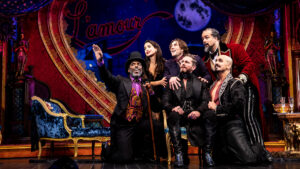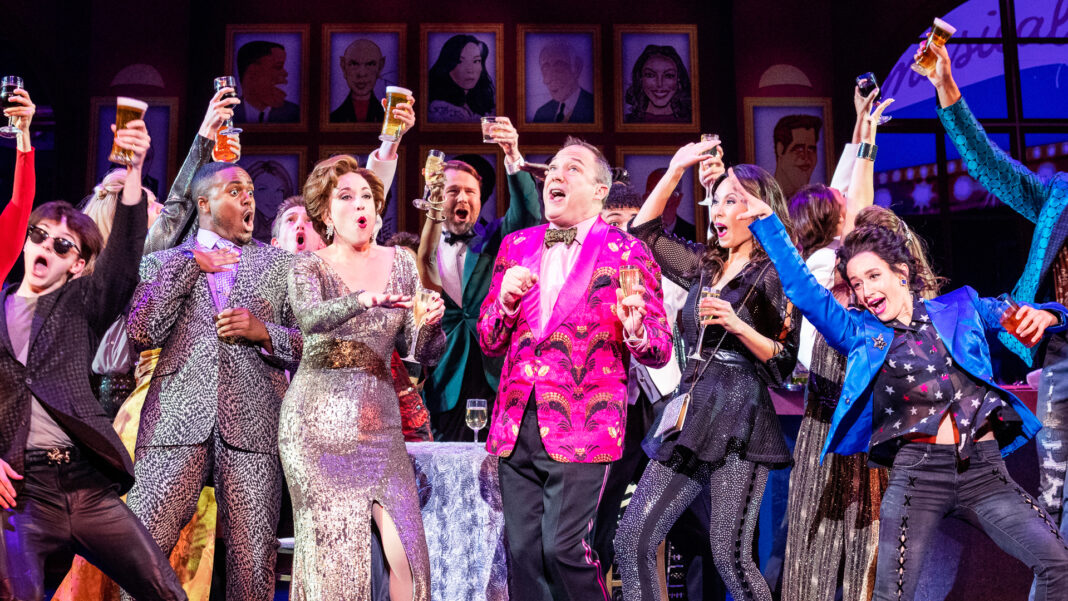
“I was working on The Prom and Moulin Rouge at the same time,” said producer Bill Damaschke. “They were very challenging for totally different reasons. They had different dynamics around them. One being totally original and one being something that everyone thought should be on stage.” Moulin Rouge was obviously based on the Baz Luhrmann film and The Prom only became a film after it had played on Broadway. Damaschke had the responsibility of getting two very musicals into shape where they could be viable on stage.
Ironically both The Prom and Moulin Rouge The Musical are touring America right now. Both happen to be in Los Angeles. The Prom opens tonight at the Ahmanson Theatre and Moulin Rouge continues at the Pantages.
Last week I spoke with Damaschke about both shows and his experiences on them. But first some details.
The Prom was nominated for seven Tony Awards. While it didn’t win any, it was the recipient of the Drama Desk Award for Best Musical. It was also a Critic’s Pick in the New York Times. The show closed after 309 performances.
Moulin Rouge was nominated for 14 Tony Awards and won ten including Best Musical. It was also a Critic’s Pick in the New York Times. The show is still running in New York.
This is a conversation about some hard truths, the freedom of creating new shows, the beauty of success and Damaschke’s unbridled love of the material he choses. What follows are excerpts from our conversation that have been edited for length and clarity. To watch the full interview, please go to our YouTube channel.
You work in feature film animation (Shark Tale, Kung Fu Panda) and theater (The Lehman Trilogy, The Ferryman). What does theater offer you that working in film does not?
I guess the thrill in both of them is seeing the germ of something, the tiny little morsel that you start with. Let’s make a show about this girl who gets denied the ability to go to her prom. Or let’s make a show called Moulin Rouge inspired by Baz’s film, or let’s make this animated film. Seeing that little morsel from the beginning and nurturing it – the thrill of that is the same in both.
I think where like the thrill of live theater is you can talk about and think about and consider all the stuff in the world you want to do, but at 7:00 the actors are going to come in, they have to warm up and they’re going to go on stage. There is a real finality to it and an urgency to it.
What was the morsel that inspired you about The Prom?

Casey Nicholaw [director of The Prom and Book of Mormon] came to us and said, “I heard this amazing idea from Jack Viertel” [SVP at Jujamcyn Theaters.] Which was, wouldn’t it be funny if a bunch of somewhat self-serving grand Broadway stars think they’re going to use their celebrity to help this girl get her prom back on?
I love stories about outsiders. The great thing about The Prom is that there’s two sets of outsiders. There’s a girl at the end of the story and her girlfriend and they’re outsiders in their community. Then there’s the New York brash people who think they know everything; the liberal New Yorkers coming to this small town to teach them a lesson. Of course, they learn something when they get there. So I love that juxtaposition and I love stories where not everyone’s right and not everyone’s wrong.
As somebody who has your foot in both film and in theater, when you look at the reviews that The Prom got on stage versus the reviews that The Prom got on Netflix, they were very different responses. I don’t know why that is, but I do have a theory that I want to run by you. This negates the economics of filmmaking because I know that you have to have the talent you had in the movie to get the movie made in the first place. But is there something about seeing actors we aren’t as familiar with play superstars or play even run-of-the-mill characters on Broadway versus seeing big stars that come with their own baggage that then compound what our expectations or even how we define who a character might be?
I don’t know that I have the objectivity to analyze it because I love the show and I love the movie and I love them for very different reasons. So many more people watched The Prom and experienced that story because of Meryl Streep and Nicole Kidman. I think there’s just a different energy when you enter a theater to see a musical. I think when you’re watching a musical on a TV screen or in a movie theater you’re more passive. If you go to see a show in the theater and it is people that are great at what they do, whether you know them as a star or a Broadway star, you can just really go into the story in a different way.
We all know how powerful The New York Times is. If you get a bad review the paper has entirely too much power and it can completely sink a show. The Prom was a Critic’s Pick. Yet the rave from the New York Times wasn’t enough to keep it running on Broadway. Why do you think that dichotomy exists?
Obviously getting a great review from The Times is helpful. It’s a show that I would have loved to have seen just being an audience member. It has absolute, rabid fans who love it and there’s an audience for it. I think that expanding that to a much broader group of people who are going to get over what the entry line is – it’s about a lesbian. That in itself actually maybe limits your audience right there.
Some people think it’s not for them. What I have found over time is that people who come to it go, “Oh, I had no idea it was going to be this.” The economics of Broadway and keeping Broadway shows running and who comes and all that, it’s such a machine in a way. There is just a limited group of tourists and there are things that they know are going to be great and then they have x number of slots available to see things that they might take a chance on. We didn’t come in with the heat of an out-of-town [tryout.] We didn’t come in with a big title. We didn’t come in with a movie title behind our name.
It seems as though Broadway is becoming more and more about pre-sold concepts and that original ideas get less attention. Ironically, we’re talking about this this just months after A Strange Loop wins the Tony Award. As a producer, how do you figure out what you think has the best chance of working and when do you roll the dice on something that isn’t a known entity?
I feel you’re right to say that in some ways what’s happened with Broadway – and there’s a million reasons for it – is similar to what happened in the movie business, especially the theatrical movie business. Now you have either big giant event-branded things or family [films] still work very, very well. Or you have tiny little things that come through Sundance or Toronto that are indie and then become Oscar contenders.
This year was a great example: it was MJ versus A Strange Loop. Both beautiful, amazing, well-crafted, completely artistic shows in totally different ways. It was the big giant Michael Jackson show and this thing that was off-Broadway and came in. We see that all the time. It’s Something Rotten versus Fun Home. Next year it will be Kimberly Akimbo versus whatever the new thing is.
If we put all of our love and heart and soul into it, maybe someone will want it when we’re done with it. But at least we’ll all have had this incredible time together working on it. I put the same kind of love and care into The Prom as we did in Moulin Rouge as I do into my animated movies. Nobody knows what works.

I want to conclude by asking you about something that Hal Prince said, probably the greatest Broadway producer in my lifetime. He said, “The idea is to work and to experiment. Some things will be creatively successful. Some things will succeed at the box office and some things will only, which is the biggest only, teach you things that see the future, and they’re probably as valuable as any of your successes.” What did The Prom and Moulin Rouge teach you?
In very different ways both of them have taught me to follow my heart and my gut and and also to choose to work with amazing and incredible people that will challenge you, will be amazing partners, will be incredible collaborators, will push you in every single way. I very much live by the school of work with people who are way better than you are. On both The Prom and Moulin Rouge the collaborators were exceptional people. I really believed in both of those projects.
I believe in The Prom. I didn’t know if it was going to be commercial. I believed in Moulin Rouge, even though I think in retrospect it was like just a layup. It was as hard for us to raise the money for Moulin Rouge as it was to raise the money for The Prom. What it came down to was do I believe in this material and do I believe in these people? Can I see myself spending the next five or ten years of my life caring about this? If the answer to all three of that is yes, then go for it.
You can watch the full interview with Bill Damaschke here.
For more on Moulin Rouge, see our interview with actress Yvette Gonzalez-Nacer here.
For upcoming tour dates for The Prom, please go here. For upcoming tour dates for Moulin Rouge please go here.
Main Photo: The cast of the touring company of The Prom (Photo by Deen van Meer/Courtesy Center Theatre Group)











